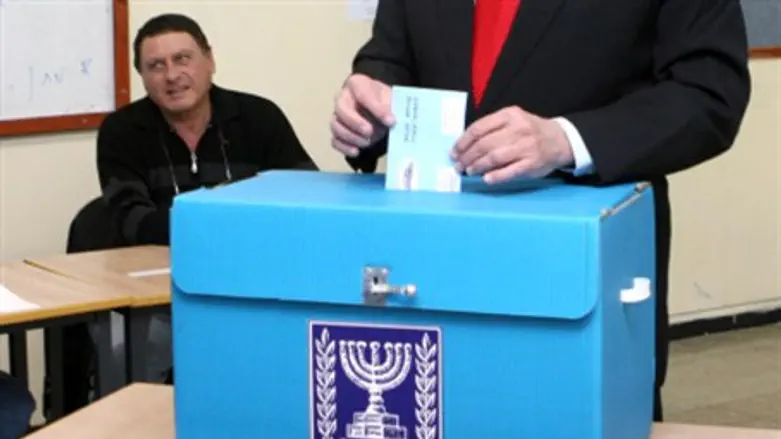
Most Israelis believe that it will be impossible to achieve peace with the Palestinian Authority in the foreseeable future - no matter who wins the election on January 22.
According to the latest poll by the Peace Index, some 67% of Israeli Jews agree with the assertion that no matter which parties prevail in the elections, the peace process with the PA will remain at a standstill for reasons not connected to Israel, and there is no chance of progress in the foreseeable future.
The poll, conducted between December 31 and January 2, found that almost two-thirds of respondents (64%) see the likelihood of a Netanyahu-led government renewing the negotiations with the Palestinian Authority as moderately low or very low. About half of the Jewish public affirms that Israel should follow the policy of the present government even at the cost of a confrontation with the U.S. administration.
As well, the poll found that 55% of Israel's Jews define themselves as right-wing, while 21% define themselves as center and 17% as left. The same holds true for voting intentions: about 50% of Jewish respondents report that they intend to vote for secular right-wing and religious right-wing parties, and 30% for parties of the center and the left, while the rest of the respondents have not yet decided or did not respond.
On the question of who is best suited to deal with political-security issues, 53% chose Prime Minister Binyamin Netanyahu, with two other figures with a pronounced nationalist profile considerably behind him. Former Foreign Minister Avigdor Lieberman was backed by 28% of respondents and Bayit Yehudi (Jewish Home) chairman Naftali Bennett was backed by 25%.
Only 19% see Hatnua chairwoman Tzipi Livni, who presents herself as an expert on these types of issues, as suited to deal with them, and even Kadima chairman Shaul Mofaz, at 21%, did better than her in this area. Only 14% view Labor chairwoman Shelly Yechimovich as qualified to deal with political-security issues, and even fewer - 8% - consider Yesh Atid (Future) head Yair Lapid to be qualified.
The poll also found that a much larger majority than the majority that opposes conceding eastern Jerusalem to the PA if there is a peace agreement opposes returning the Golan Heights to the Syrians even if there is a peace agreement that includes appropriate security arrangements (84%).
Several polls conducted recently have found that there is a strong rejection among Israelis to conceding lands to Arabs or to establishing a Palestinian state.
A poll last week found that about 83 percent of Israelis believe that pulling back to the indefensible pre-1967 borders will not bring an end to the Arab-Israeli conflict nor bring a peace accord with the Palestinian Authority.
The poll, which was conducted by Dr. Mina Tzemach on behalf of the Jerusalem Center for Public Affairs, also measured the willingness of those polled to change who they vote for, if they found out that their party would be ready to cede east Jerusalem and the Old City in a peace deal. The majority, 69% among the general public and 78% among Jews only, said they would change their vote if their party was willing to relinquish land and Israeli sovereignty over east Jerusalem.
A second poll released last week shows that, for the first time, a plurality of Israelis now oppose the “two-state solution.”
The poll, by the highly respected Geocartographia organization, found that 45% of Israelis are against the idea of setting up a PA state in Judea and Samaria. Forty percent said they support it, and 14% did not respond to the question.
A poll taken in December found that only 28.2% of Israelis believe that Israel has a partner for peace in negotiations with the PA. 62.4% say there is no partner for peace.
